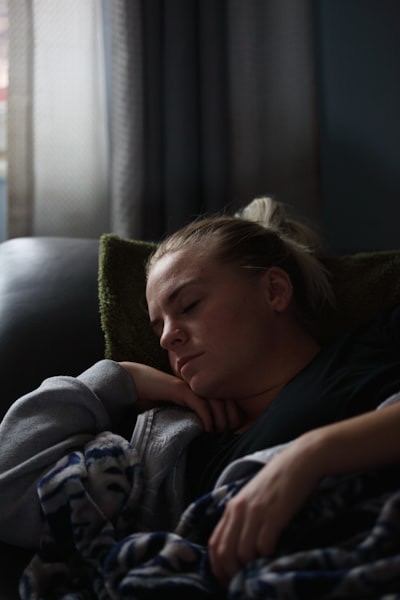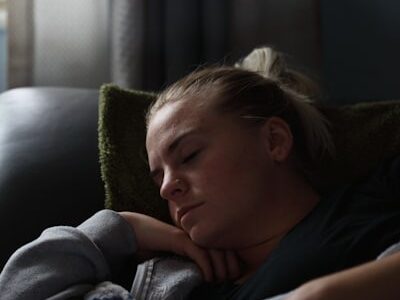Effective Snoring Remedies for a Peaceful Night

Key Highlights
Snoring is something a lot of people deal with, and it can mess up your sleep or even lead to serious health stuff like high blood pressure and heart problems. Making some changes in how you live, like dropping some weight, not drinking alcohol before bed, and sleeping on your side might make the snoring less of a problem. For those who have it really bad, there are medical ways to tackle it too. Things like using machines that help keep your airway open while you sleep or even getting surgery could be options. Trying out simple things at home such as switching up how you sleep or improving what you eat and exercising more can also cut down on the snoring. If snoring comes along with signs of sleep apnea or is messing up how well you live life big time, talking to someone who knows all about sleeping issues is key.
Introduction

Snoring is a common condition that a lot of people deal with when they sleep. It’s not usually a big deal if it happens once in a while, but if someone snores all the time, it might be something to worry about for both the person snoring and their bed partner. When air can’t move freely through your nose and mouth during sleep, it makes the tissues around there shake, which creates that loud snoring noise we’re familiar with. Sometimes, this snoring could point to something more serious like sleep apnea. This condition means you stop breathing off and on throughout the night. Figuring out why you’re snoring and how to stop it is really important for getting a good night’s sleep and staying healthy.
- With sleep apnea being such a concern,
- For those sharing their sleeping space with a bed partner,
- Recognizing these signs as potentially indicating a serious condition,
- Understanding what causes these interruptions or apnea,
- And seeking effective remedies are crucial steps
Understanding Snoring and Its Impact on Sleep

When you snore, it’s because the muscles and tissues in your throat and airway relax a bit too much. This can make it hard for air to get through, which makes those tissues vibrate and creates that familiar snoring sound we all know. Snoring isn’t just noisy; it can mess with your sleep and the sleep of whoever shares your bed, making everyone feel less rested and causing a nuisance. If someone snores a lot, they might have something called obstructive sleep apnea. It’s a serious condition where breathing stops and starts while sleeping, leading to bigger health problems if not taken care of.
Defining Snoring and Its Common Types
When you snore, it’s because the air moving past the soft parts in your throat makes them shake as you breathe, creating that rough sound we all know as rattling. It happens to lots of people, no matter their age or if they’re a guy or girl. Snoring usually comes from when these soft spots in your throat relax too much and make it hard for air to get through, which is what causes that snoring noise. A big reason some folks snore really loud is something called obstructive sleep apnea. This means they stop breathing for a bit after making a lot of noise with their rattling snores. If someone’s sawing logs louder than usual, they might want to talk to a doctor since it could be this sleep apnea thing.
Exploring the Health Implications of Chronic Snoring

If you’re someone who snores a lot, it’s not just a noise issue; it can actually be pretty serious for your health if you don’t deal with it. Snoring is tied to some big health problems like high blood pressure and cardiovascular disease, along with messing up how well you sleep. When your breathing isn’t smooth while sleeping, the amount of oxygen in your blood goes up and down too much. This makes your heart work harder than it should have to. Over time, this extra work can lead to higher blood pressure and make heart problems more likely. On top of that, snoring badly can mess with getting a good night’s rest which means you might feel really tired during the day, find it hard to stay awake or think clearly. So yeah, taking care of snoring is important not just for peace at home but also for keeping these health risks, including potential complications, low.
Identifying the Causes of Snoring
Snoring can come from different places, like body issues or the way we live. For example, obstructive sleep apnea is when your breathing passage gets partly or fully blocked while you’re asleep. Other physical problems could be a crooked wall in your nose called a deviated septum or stuffy nose issues. On the lifestyle side of things, drinking alcohol might make snoring worse because it makes the muscles in your throat too relaxed, which can block that airway. Smoking isn’t great either; it bothers and swells up those air passages. Figuring out why someone snores is really important to help them stop doing it with the right remedies.
Physical Factors Contributing to Snoring
One big reason people snore is because of something called obstructive sleep apnea (OSA). This happens when the airway gets partly or totally blocked while sleeping. A bunch of things can cause OSA, like being overweight, having certain physical traits such as a deviated septum or big tonsils or adenoids, and weak throat muscles. These issues make the airway narrow and lead to snoring, especially when the muscles in the roof of your mouth relax and partially block your airway.
With nasal congestion and other physical blockages, such as a deviated septum, playing a role too, it’s another factor behind snoring. When your nasal passages get clogged up from allergies, colds, or sinus infections, you’re more likely to snore. Also, a crooked partition between your nostrils known as a deviated septum can mess with airflow and add to the problem of obstruction. Figuring out these physical causes, such as blockages and obstructions, is key in reducing snoring for better sleep quality.
Lifestyle Factors That Aggravate Snoring

Besides physical stuff, the way we live can also make snoring worse. Drinking alcohol before hitting the sack relaxes your throat muscles and makes it more likely for your airway to get blocked, which means you’ll probably snore. Avoiding alcohol and sedatives before bedtime is crucial for reducing snoring. Smoking is another thing that doesn’t help because the smoke messes with your breathing tubes, making them swell up and increasing your chances of snoring. Also, sleeping on your back isn’t great since gravity squishes down on your throat and narrows the space for air to flow through; this ends up making any snores louder. By cutting down on drinks before bedtime, stopping smoking, and changing how you sleep can really help sort out snoring issues and let everyone catch some better Z’s.
Practical Steps to Alleviate Snoring
If you’re someone who snores, don’t worry; there are some straightforward things you can do to help sort it out and get better sleep. For starters, try changing how you lie in bed since certain positions can make snoring less likely. Along with that, looking at what you eat and making sure to stay active could also make a big difference not just for your weight but in cutting down on the snoring too. And let’s not forget about trying different home remedies and natural solutions that might work for you. It’s true that not every remedy will be the right fit for everyone, but with a bit of experimenting, it’s possible to find the perfect mix of changes that’ll lead to quieter nights.
Adjustments in Sleeping Positions to Reduce Snoring

To help with snoring, changing how you sleep can make a big difference. When you lie on your back, it makes snoring worse because gravity pushes down and narrows the airway in your throat, making the noise louder as tissues vibrate more. On the other hand, sleeping on your side might be better since it helps keep that airway open and cuts down on snoring. Some folks have found that putting tennis balls into a sock and then attaching it to the back of your pajamas stops them from rolling onto their backs while they’re asleep. Also, using special pillows or sleep aids that ensure you’re aligned properly can lessen snoring too. For extra advice about which sleep position works best for stopping snores,sleep medicine experts are there to guide you further.
The Role of Diet and Exercise in Managing Snoring

Eating right and staying active are key to controlling snoring. When you keep a healthy weight by eating well and moving more, it lowers your chances of snoring. That’s because being overweight can cause extra fat to build up in your throat, making the space inside smaller which makes it harder for air to move through when you’re asleep. By sticking with a good diet and exercising often, not only can you lose some weight but also sleep better at night. Also, try not to eat too much or drink alcohol before going to bed; this can really help cut down on snoring. So, changing what you eat and how much you exercise could lead to quieter nights.
Medical Interventions for Snoring
Sometimes, just changing how you live isn’t enough to stop the snoring. If it’s really bad or if there are signs of sleep apnea, getting medical advice is key. You might need to see a sleep specialist and have a sleep study done to figure out why you’re snoring so much and if there’s more going on when you snooze. Depending on what they find, surgery or other treatments could be suggested based on the severity of your snoring. A doctor has to check everything carefully first before deciding what will help the most, including taking a thorough medical history.
When to Consider Seeing a Specialist
If changing your daily habits doesn’t stop the snoring or if you’re showing signs of sleep apnea, it might be a good idea to see an otolaryngologist, also known as an ear nose and throat specialist. They are experts in diagnosing and treating sleep problems, including snoring and sleep apnea. They will examine your throat and neck, as well as the inside of your mouth, to determine the cause of your snoring. If necessary, they may recommend further tests, such as a sleep study, to accurately diagnose the issue. By consulting with an otolaryngologist or pediatrician, you can ensure that the root cause of your snoring is properly identified and treated.
Overview of Surgical and Non-Surgical Treatments

There are various surgical and non-surgical treatments available for snoring and sleep apnea. Non-surgical treatments include the use of continuous positive airway pressure (CPAP) devices, which deliver a constant flow of air through a mask worn over the nose or mouth to keep the airway open during sleep. CPAP is effective in treating obstructive sleep apnea and reducing snoring. Surgical treatments for snoring and sleep apnea may involve removing excess tissue in the throat, repairing structural abnormalities, or implanting devices to support the airway. The choice of treatment depends on the severity and underlying causes of snoring, and should be discussed with a healthcare provider or sleep specialist.
| Surgical Treatments | Non-Surgical Treatments |
| – Removal of excess throat tissue | – Continuous positive airway pressure (CPAP) devices |
| – Repair of structural abnormalities | – Oral appliances |
| – Implantation of airway support devices | – Weight loss |
| – Radiofrequency ablation |
Home Remedies and Natural Solutions
Besides medical help, there are quite a few home remedies and natural ways to cut down on snoring. For starters, getting your sleep habits right is key—like sticking to a consistent bedtime and making sure where you sleep is comfy. Using nasal strips or dilators can make breathing easier by improving airflow, while steering clear of stuff that makes your nose stuffy can also be a big help. Making some lifestyle changes plays a part too; think about quitting smoking or drinking less alcohol to see if it helps with the snoring. Experimenting with different sleeping positions, maybe adding some pillows into the mix for better support, or trying relaxation techniques before hitting the hay could all contribute to quieter nights.
Herbal Remedies That Can Ease Snoring
To tackle snoring, there are some natural remedies that can really help you sleep better. For starters, nasal strips come in handy. You stick these adhesive strips on your nose to make the nasal passages wider and improve airflow. This is great for folks whose snoring comes from stuffy noses or blocked airways. Then there’s the option of using essential oils like peppermint or eucalyptus oil. You can put a few drops into a humidifier or diffuser at night to clear up those nasal passages and breathe easier while you’re asleep. And don’t forget about herbal teas! Drinking chamomile, lavender, or valerian root tea before hitting the bed can relax your muscles and set you up for a good night’s rest.
DIY Adjustments for a Snore-free Sleep Environment
To make your sleep zone quiet without snoring, you can try a few easy do-it-yourself fixes. Keeping the bedroom clean and free from things that cause allergies is key. Stuff like dust mites can block your nose and lead to snoring. By vacuuming often, wiping away dust, washing sheets in hot water, and using special covers for pillows and mattresses that keep allergens out, you might find yourself snoring less because of allergy issues. Another handy tip is to lift up where your head rests when sleeping by either getting a wedge pillow or putting blocks under the bed’s feet; this trick helps air move better by not letting your breathing tubes get squished as much. For those with stuffy noses leading to noisy nights, rinsing out nasal passages with saltwater could clear things up and cut down on the snoring caused by nasal congestion.
Advanced Solutions and Technologies
For folks dealing with heavy snoring or sleep apnea, there are some pretty advanced ways out there to help manage it. These include cool gadgets and apps that keep an eye on how you sleep and tell you about your snoring. One of the main tools used for serious cases is called a continuous positive airway pressure (CPAP) machine. This gadget helps by pushing a steady stream of air through a mask that goes over your nose or mouth, which keeps your breathing passage open while you snooze. With these high-tech solutions, people who have tough-to-handle conditions can see a big improvement in their sleep quality and cut down on the snoring.
Innovative Devices and Apps for Snoring Management
New gadgets and apps are now great at helping people deal with snoring and sleep apnea. With some of these, you can keep an eye on how you sleep and get tips on your snoring habits. This way, folks can see how they’re doing over time and figure out what changes might help. These tools usually work alongside apps that offer extra help and advice. For tackling snoring head-on, a lot of people turn to something called a continuous positive airway pressure (CPAP) machine. By wearing a mask that fits over your nose or mouth, CPAP machines make sure there’s always enough air pressure to keep your breathing passages open while you snooze. This not only cuts down on snoring but also makes sleeping much better for those struggling with sleep apnea symptoms.
The Effectiveness of CPAP Machines for Severe Cases
CPAP machines are really good at helping people who snore a lot or have sleep apnea, especially if it’s pretty bad. These machines keep a steady stream of air going through either a nose or mouth mask. With this airflow, the airway stays open all night long, which means no more stopping breathing while asleep and less snoring too. For folks with serious sleep apnea where their throat gets totally blocked when they’re snoozing, CPAP is super helpful. It makes sure there’s always enough air getting through so they can have a better night’s rest and not suffer as much from severe sleep apena symptoms.
Lifestyle Changes for Long-term Relief
Besides getting medical help, adopting some lifestyle changes can also offer lasting relief from snoring. Managing your weight is crucial since being overweight is often linked to snoring and sleep apnea. Shedding pounds by eating right and staying active can cut down on the frequency of snoring. It’s also vital to steer clear of drinking alcohol and smoking because these habits tend to make snoring worse. By embracing these lifestyle adjustments, people can find long-term freedom from snoring and see an improvement in their overall quality of sleep.
Importance of Weight Management in Reducing Snoring
For folks carrying extra weight, shedding some pounds is a good move to cut down on snoring. When people are overweight or obese, they tend to have more fat around their neck and throat. This can make it hard for air to flow smoothly when they’re asleep, leading to those loud snores we all want to avoid. By eating right and staying active with regular exercise, individuals can get rid of that extra fat in the throat area which helps air move better during sleep. Losing weight isn’t just great for reducing snoring; it also boosts overall health and lowers the chances of getting sleep apnea—a pretty common issue where breathing stops and starts throughout the night.
The Impact of Alcohol and Smoking on Snoring and sleep apnea
Drinking alcohol and smoking can really affect how much you snore. When you drink, the muscles in your throat that help keep your breathing path open get too relaxed. This makes the space for air to flow through smaller, which can make you snore more. Smoking is just as bad because it messes with your respiratory system and swells up your throat, making it easier for snoring to happen. If you want to cut down on snoring, try not drinking alcohol before going to bed and think about giving up smoking altogether. By making these lifestyle changes, not only could you sleep better but also see a big drop in how often and loudly you snore.
Conclusion
Snoring can really mess with how well you sleep and affect your overall health. By figuring out why you snore and taking steps like changing the way you sleep, living healthier, and looking into medical help when needed, you can tackle this problem. There are lots of ways to deal with snoring, from simple home remedies to using the latest gadgets. Making lifestyle changes such as keeping a healthy weight and staying away from booze and cigarettes could make a big difference in the long run. If your snoring doesn’t stop, it’s important to get advice from someone who knows their stuff about it. Taking action against snoring not only helps you sleep better but also makes your life better overall. Don’t forget that getting enough good sleep is key for staying happy and healthy.
Frequently Asked Questions
Are there any quick fixes for snoring complications?
There aren’t any instant solutions to stop snoring, but there are a few tactics that might offer some short-term relief. By using nasal strips, you can make the nasal passages wider and enhance airflow. If you sleep on your side rather than on your back, it could also help cut down on snoring. Moreover, steering clear of big meals right before bedtime and tackling nasal congestion can aid in reducing snoring issues.
How does snoring affect relationships and what can be done?
When someone snores really loudly, it can mess with both their own sleep and the sleep of the person sharing the bed. This kind of disturbance often leads to not getting enough rest and feeling cranky, which isn’t great for any relationship. It’s crucial to tackle this issue by looking into ways to stop snoring so everyone can have a better night’s sleep. Talking things out and being understanding with each other are important steps in figuring out how to deal with loud snoring together. Finding remedies or treatments should be a priority to make sure both partners are happy and well-rested.
https://order.store.mayoclinic.com/hl/HLFREEB
https://www.ncbi.nlm.nih.gov/pubmed/38589791
https://clinicaltrials.gov/search
